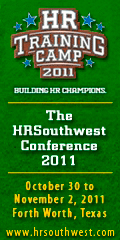
| Archives/Subscribe | Advertise | HR Matters | www.texasshrm.org |
General: I’ve been searching for a law that addresses a specific situation I am dealing with, but I can’t find one. What can I do? There are many sources of employment laws, and you may find yourself searching for quite some time, as a result. You may look in federal laws, state laws and case law. In some cases, you will find guidance in the laws, and in other cases, you may determine that there is no law. No law exists: It is possible that there isn’t a law that addresses the situation you are currently dealing with. Sometimes, it’s surprising that a law has not been passed about a common HR issue. For example, for most workers there is no federal law that mandates meal periods or rest periods; this is sometimes addressed by state law, and in other instances, there simply isn’t a law that mandates any breaks at all. Further, there isn’t one individual law that determines how long employee files should be kept or how they should be kept. Each employment law has its own provisions, and as a result, each document has a different retention length or may not be mandated to be retained at all. In order to determine that there isn’t a law, regulation or court case that applies to your situation, you need to consult an attorney. If there isn’t any legal guidance about your situation, you will need to make decisions bases on other factors such as good employee relations practices, expense to the employer and the organizational culture. Federal law: The first place to look would be federal law. There are many sources to find information about federal employment law. For example, the Government Printing Office has the Code of Federal Regulations online. Many of the employment-related laws, including FLSA and FMLA, are in Title 29 of the CFR. Also, government websites have helpful information that may be easier to understand and apply than the CFRs. Federal Government Websites Relevant to HR: State law: States have laws on a variety of topics that might affect HR. Searching various state agency websites may help you find applicable laws. On SHRM’s website, you can find links to state offices, as well as state law information in the State Employment Law Charts. You can obtain a list of state resources under the State Law Resources section of SHRM’s Express Requests. Case law: Often, legal obligations for employers arise from case law. While there isn’t one specific place to search for cases, SHRM publishes news articles about important cases in the Employment Law Issues area of the website. However, in many instances, an attorney’s assistance will be required to determine whether a case you’ve read about applies to your circumstances. Searching and interpreting the application of federal, state and case law takes a good deal of expertise. Nuances such as the definition of an employee under a given law, the jurisdiction where a court case took place or whether a higher court has addressed an issue can affect the applicability of the source you’ve found to your situation. Therefore, before making decisions based on your findings, consult your attorney. SHRM HR Knowledge Center |
P.O. Box 8058
Tyler, Texas 75711
www.texasshrm.org • info@texassshrm.org • 214-354-8740


